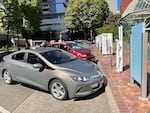Portland is set to increase public charging stations for electric vehicles throughout the city to meet the needs of residents who cannot afford to charge their cars at home.
On Wednesday, Portland City Council unanimously approved the city Bureau of Transportation’s EV charging in the right of way project. It will allow vehicle charging companies and utilities to install public chargers in areas throughout the city that currently lack the infrastructure. The program is intended to increase charging reliability, affordability and accessibility for renters and those living in multi-dwelling units without access to chargers. The program will install level 2 chargers which can fuel up a car in about four hours.
Commissioner Mingus Mapps, who oversees the Transportation Bureau and introduced the ordinance last week, said the policy change contributes to at least three of the City Council’s goals: reaching the city’s climate action goals, easing access to EVs and keeping equity at the forefront of clean energy plans.
“[The ordinance] is important because it advances equity by laying out a plan to build out electric vehicle infrastructure in BIPOC and low-income neighborhoods,” Mapps said during last week’s City Council meeting putting the ordinance forward.
Oregon’s transportation sector accounts for around 40% of the state’s total greenhouse gas emissions, the largest single source. As the state plans to end the sale of new gas-powered vehicles by 2035 and more residents are transitioning to electric ones, the need for public EV charging stations has increased. As of October 2022, there are nearly 60,000 registered electric vehicles in the state, but barriers like affordability, demand and lack of charging stations have created a gap for low-income and communities of color to access these vehicles.

FILE - Electric vehicles charge at a charging station in downtown Portland.
Monica Samayoa / OPB
During last week’s City Council meeting, PBOT analyst Jacob Sherman said most EV charging stations are in downtown Portland with few located to the north near the University of Portland or farther east by Mount Tabor. He said the goal of the program is to fill the gaps where these stations are needed. He said the program will ensure chargers are going to be in areas with higher concentrations of multi-dwelling housing or where residents don’t have access to a garage or driveway.
“We need about 30% more chargers right now or in 2025 than we currently have, and that demand is expected to increase substantially over time,” Sherman said. “This is also the most conservative scenario.”
Sherman said the ordinance will provide clarity through city codes and administrative rules on which areas private companies can install the chargers. Some of those include making sure they are located on a local service street, 5 feet away from a driveway and making sure they are designed to meet Americans with Disabilities Act requirements. There will also be parking requirements to ensure there is turnover and allow people to use the chargers overnight.
PBOT will not own, operate or maintain the chargers. Sherman said funding for the chargers would come from the private sector, but PBOT will be working toward receiving funding from the federal Bipartisan Infrastructure Law, which has allocated $7.5 billion to build out a nationwide network of EV chargers by 2030. PBOT plans to work with utilities and private EV charging companies on siting the chargers.
Sherman said it can cost anywhere between $10,000 and $20,000 to install level 2 chargers. From there, companies would create a payment system that drivers would use to purchase the electricity for their cars.
“We’re setting up the rules for the private sector to make the investments and they’ll be responsible, as they are with telephone poles and other things for owning, operating and maintaining that equipment,” Sherman said. “We’re just kind of setting the rules in the framework where the market can do business.”
Several climate and transportation advocates said they support the rules because they will help Oregon and Portland reach their climate goals in the next two decades.
Shannon Walton Clark, senior policy manager for electric vehicle advocacy group Forth, said installing public EV charging stations in traditionally underserved communities will maximize the economic and environmental benefits of a changing transportation network.
“Most folks who live in cities do not have access to a garage or driveway, and the cost to install a private electric vehicle charger can cost up to thousands of dollars,” they said. “Sufficient public charging infrastructure is essential to increase access to electric vehicles.”
PBOT expects to begin issuing permits later this year with the goal of more chargers being available later this year or in early 2024.
Wednesday’s vote is the second recent attempt at making EVs more approachable for Portlanders. Last month, the City Council voted unanimously in favor of the EV ready code project. It will require newly built multi-dwelling housing with five or more units that provide on-site parking to install the necessary conduits and electrical panel space for level 2 EV charging.
